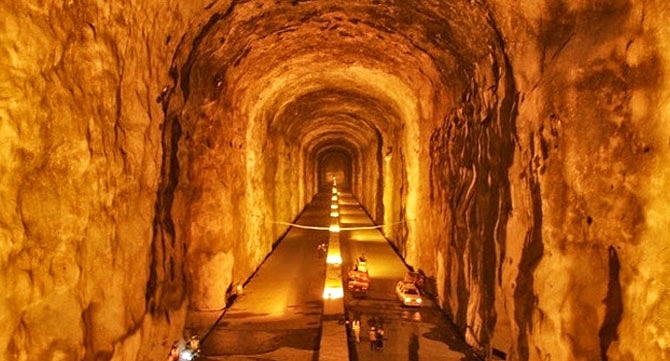Insta
India’s Strategic Petroleum Reserves Reach 74 Days Capacity, To Establish Two More Reserves In Odisha And Karnataka

A strategic oil reserve near Visakhapatnam (Indian Strategic Petroleum Reserves Limited)
India’s total national capacity for storage of crude oil and petroleum products has reached 74 days, the Ministry of Petroleum and Natural Gas said in a statement.
This got possible as Indian Strategic Petroleum Reserve Limited (ISPRL), a Government of India Special Purpose Vehicle, has established Strategic Petroleum Reserves (SPR) facilities with total capacity of 5.33 Million Metric Tonnes (MMT) at 3 locations, namely Visakhapatnam, Mangaluru and Padur.
As per the consumption pattern of 2019-20, the total capacity is estimated to provide for about 9.5 days of crude oil requirement.
Taking advantage of low crude oil prices in April/May 2020, the Strategic Petroleum Reserves have been filled to full capacity, leading to savings of approximately Rs 5000 crore.
Under Phase II of the SPR Program, the Government has given ‘in principle’ approval in June 2018 for establishing two additional SPR facilities with total storage capacity of 6.5 MMT at two locations namely Chandikhol in Odisha (4 MMT) and Padur in Karnataka (2.5 MMT).
As per the consumption pattern of 2019-20, 6.5 MMT SPR capacity is estimated to provide for about additional 12 days of India’s crude oil requirement.
Imports are the primary source for India’s energy needs. This makes India highly vulnerable to which to supply side risks, particularly during the times of war or natural exigencies.
Ensuring energy security by decreasing India’s vulnerability is significant as the country’s energy consumption is projected to grow at 4.2 per cent annually up to 2035 and its share of global energy demand is set to nearly double to 11 per cent by 2040.
SPR facilities play a significant role in ensuring energy security.
Support Swarajya's 50 Ground Reports Project & Sponsor A Story
Every general election Swarajya does a 50 ground reports project.
Aimed only at serious readers and those who appreciate the nuances of political undercurrents, the project provides a sense of India's electoral landscape. As you know, these reports are produced after considerable investment of travel, time and effort on the ground.
This time too we've kicked off the project in style and have covered over 30 constituencies already. If you're someone who appreciates such work and have enjoyed our coverage please consider sponsoring a ground report for just Rs 2999 to Rs 19,999 - it goes a long way in helping us produce more quality reportage.
You can also back this project by becoming a subscriber for as little as Rs 999 - so do click on this links and choose a plan that suits you and back us.
Click below to contribute.
Latest